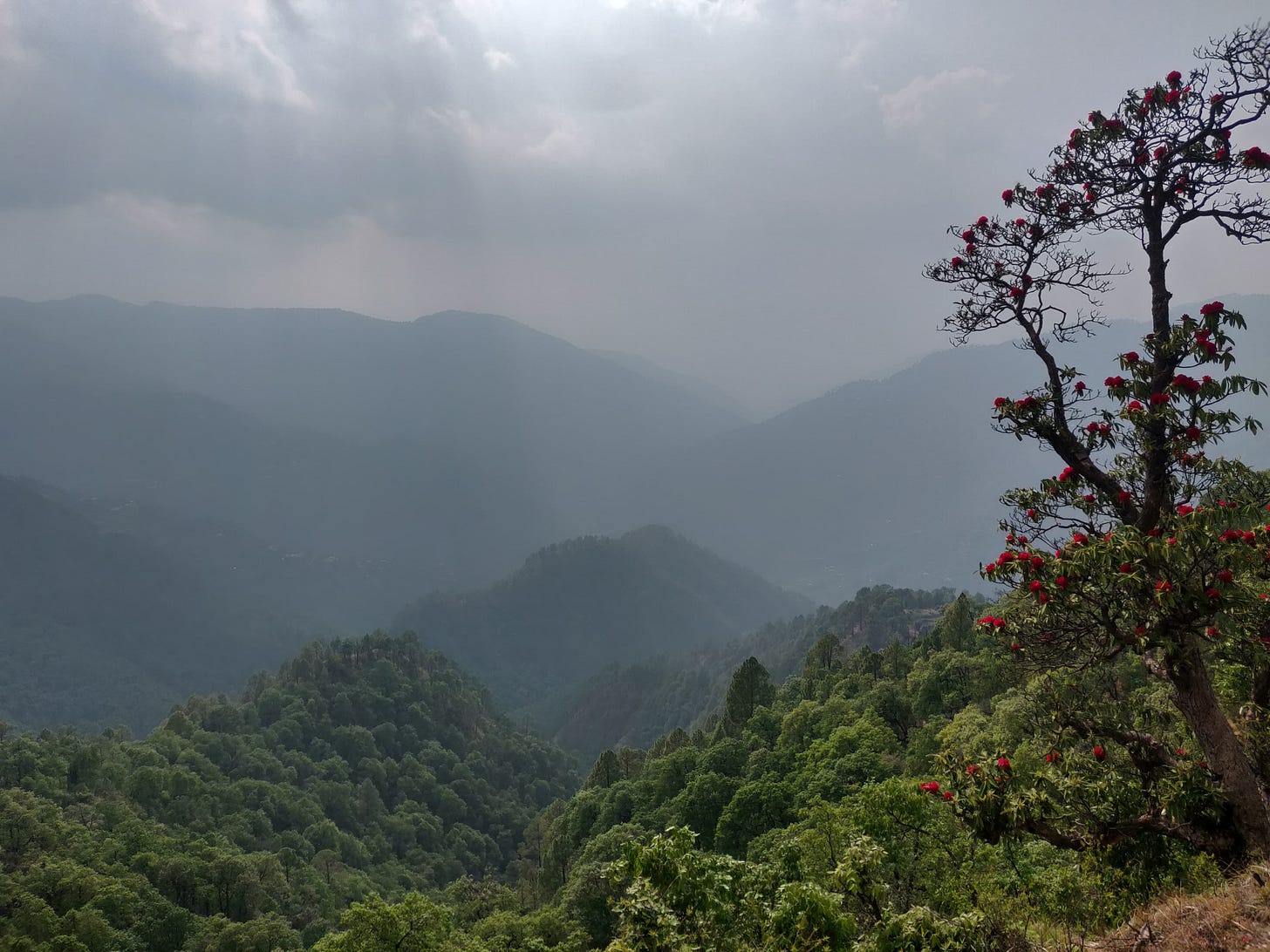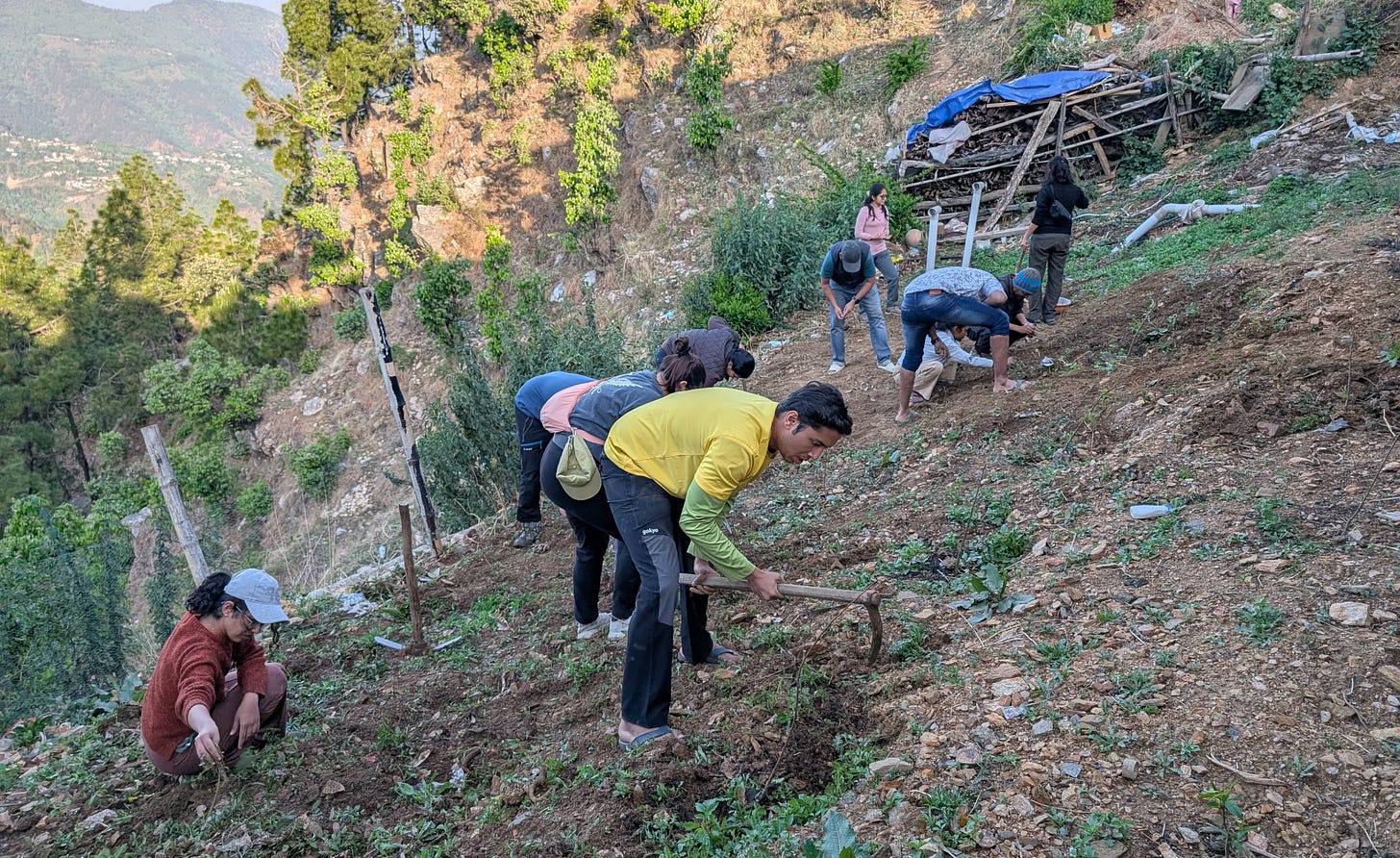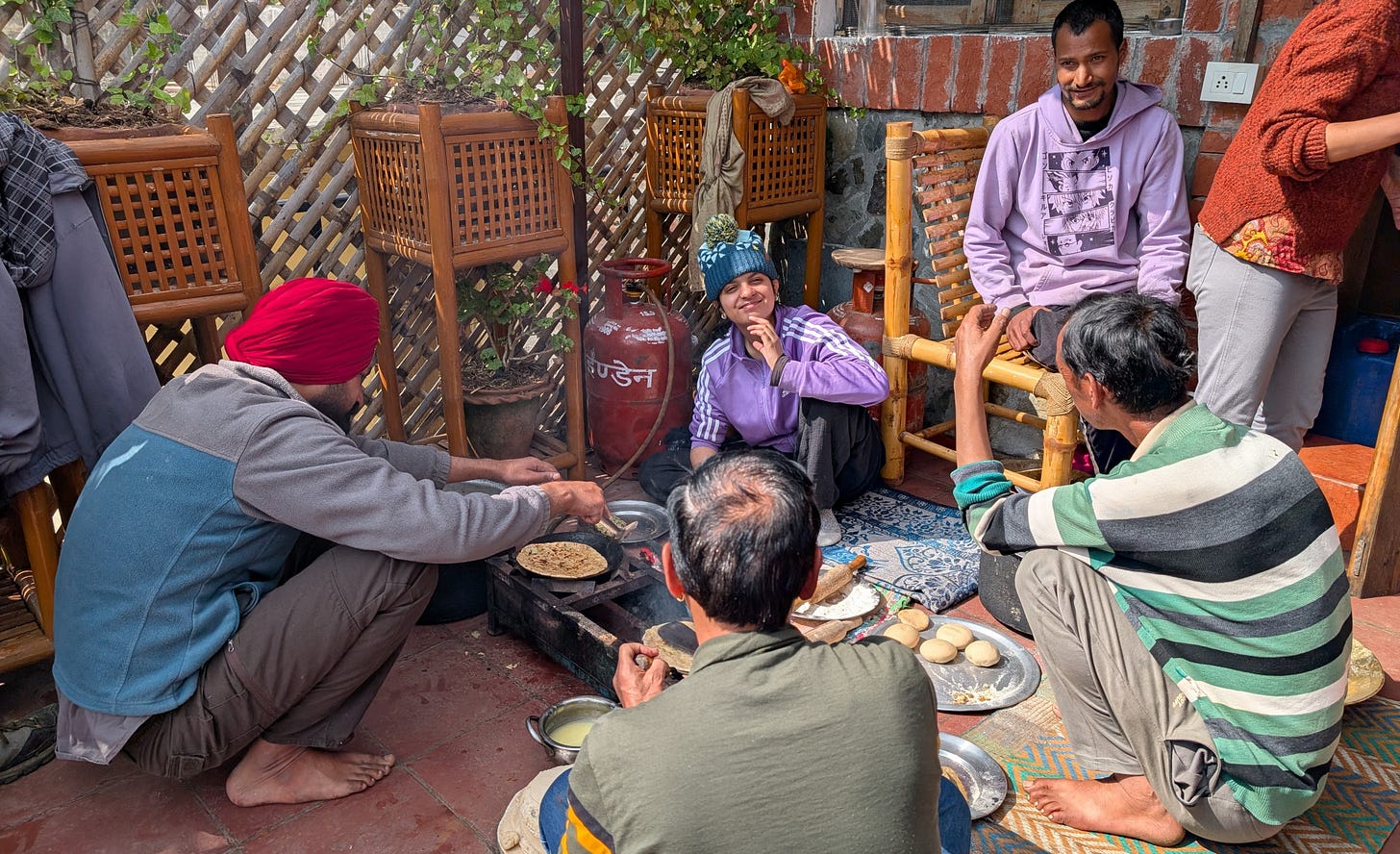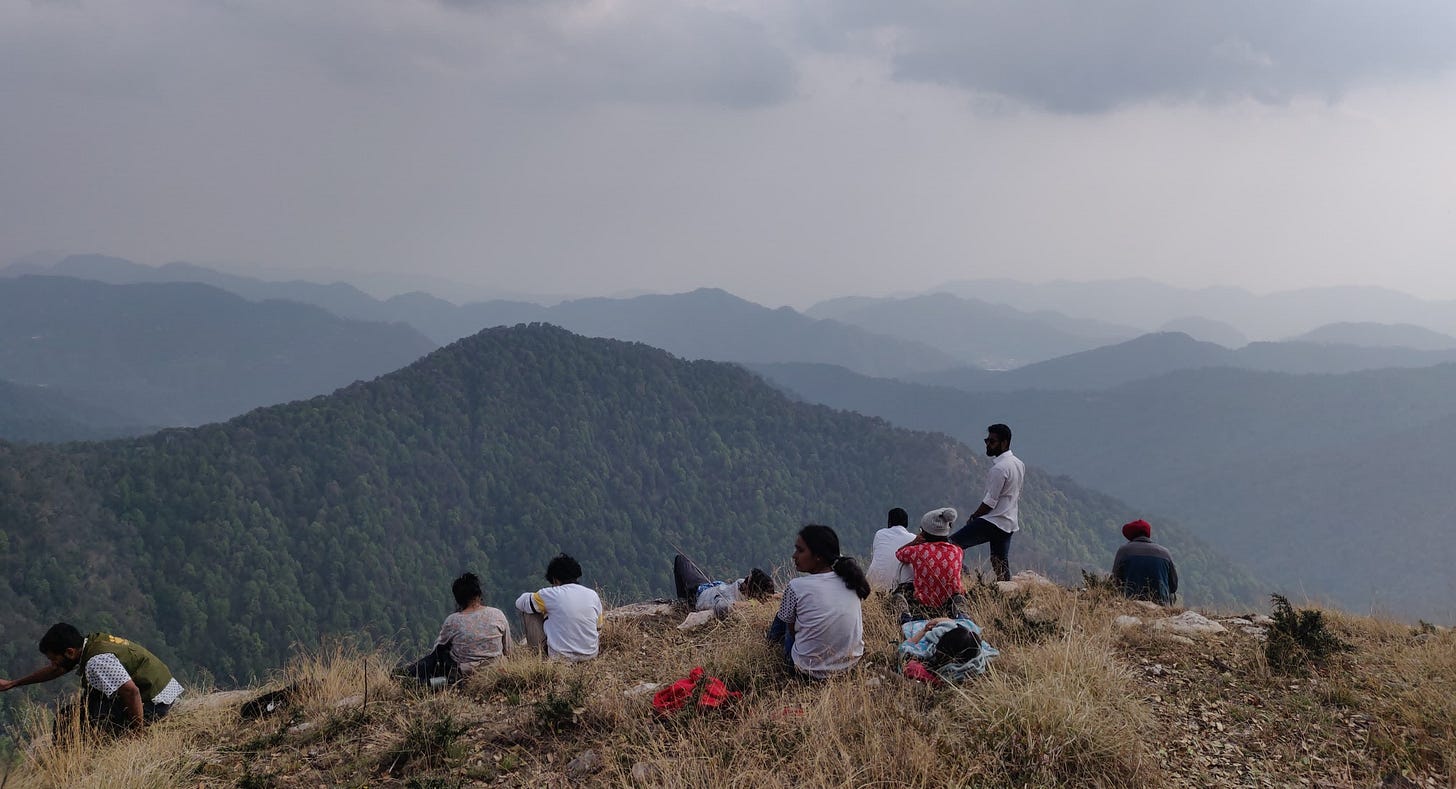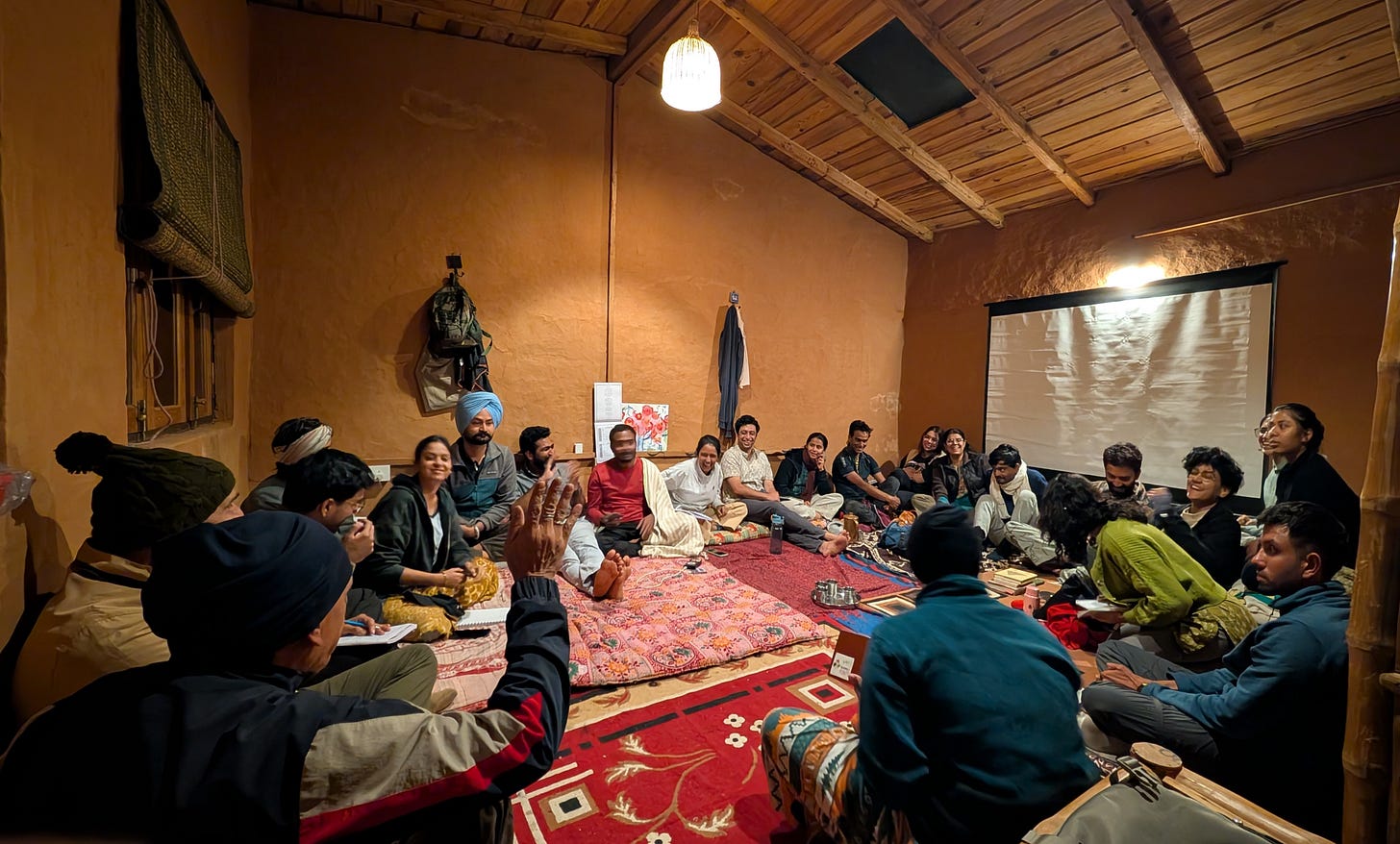As the month of Vaisakh began in the mountains of Kumaon, Buransh (Rhododendron) trees bore bright red blooms among the multi-hued forests of Kharsu and Baanjh Oaks. Chilly winds were blowing in from the Upper Himalayas, bringing in occasional rain showers. Tender fruitlings had begun sprouting from Apricot, Plum and Peach trees and the branches of old Apple trees were decked with delicate pinkish-white flowers. Ripe peas were being gathered from terraced-farms while the wheat was still green. In one such Kumaoni hillside village, 25 of us had come together to learn a few things about food and agriculture.
Aged between 21 and 41 and coming from different parts of the country, we began by discussing our relationship with our food. Some of us were from villages, some from small towns, some from metros, and some who had been abroad. We reflected on how our food reaches us and what goes into bringing that food to our table. Each person shared their experiences with the food supply chain they have seen.
The group had friends who are artists and filmmakers, some who work in public policy, some who are into nature conservation and climate sustainability. There were food researchers-writers, some social-development sector and NGO professionals, a few working in healthcare and some working in education.
As the course progressed deeper into questions of political economy, history, social relations, material production, and philosophy, each participant drew from their life to share anecdotes, stories, and reflections. Cooking together, forest walks, conversation with elders, and farm-work in the morning wove together the many themes of the seven-day discussion.
Through stories, anecdotes, and his extensive ground research Negi ji told us at length about the changes in farming practices of Uttarakhand and India in general. We also got to know about people’s reliance and relationship with the forests of the region and how the complex ecological relationships of the Oak forests home a rich biodiversity. Aseem ji informed us about the history of changes to the forests of Kumaon under the forest policies introduced by the British and people’s systems of forest management. On our various walks into different parts of the forests, we got to see the vast ecological changes happening in the area, including water sources drying up, disappearing flora and fauna, forest fires in the Pine forested regions, and rising human-animal conflicts.
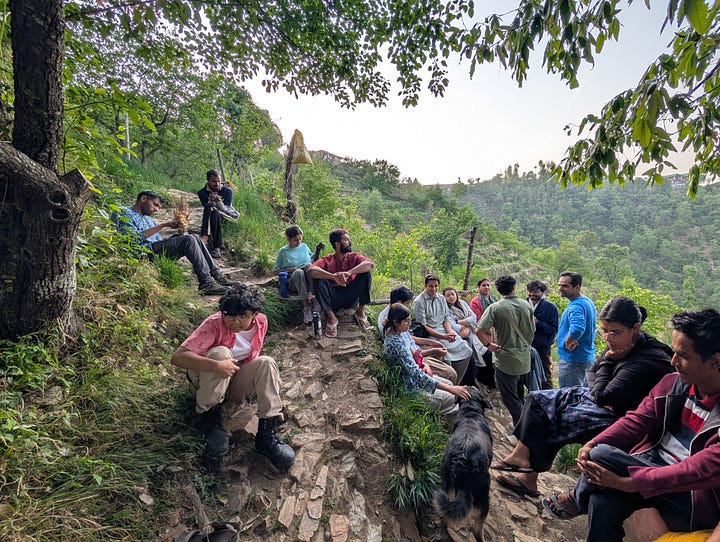
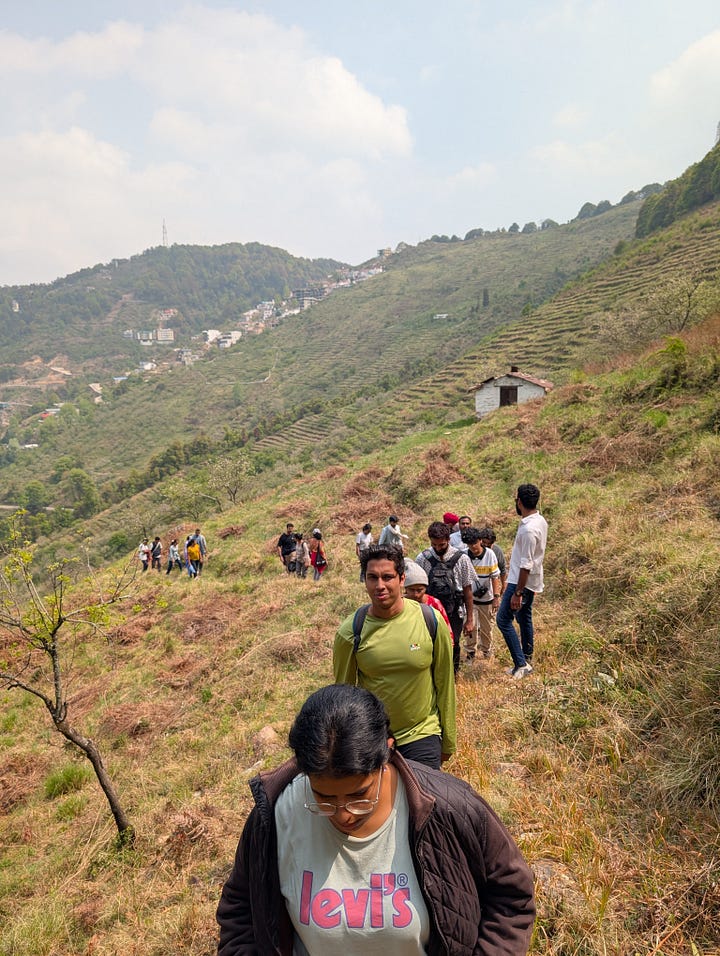

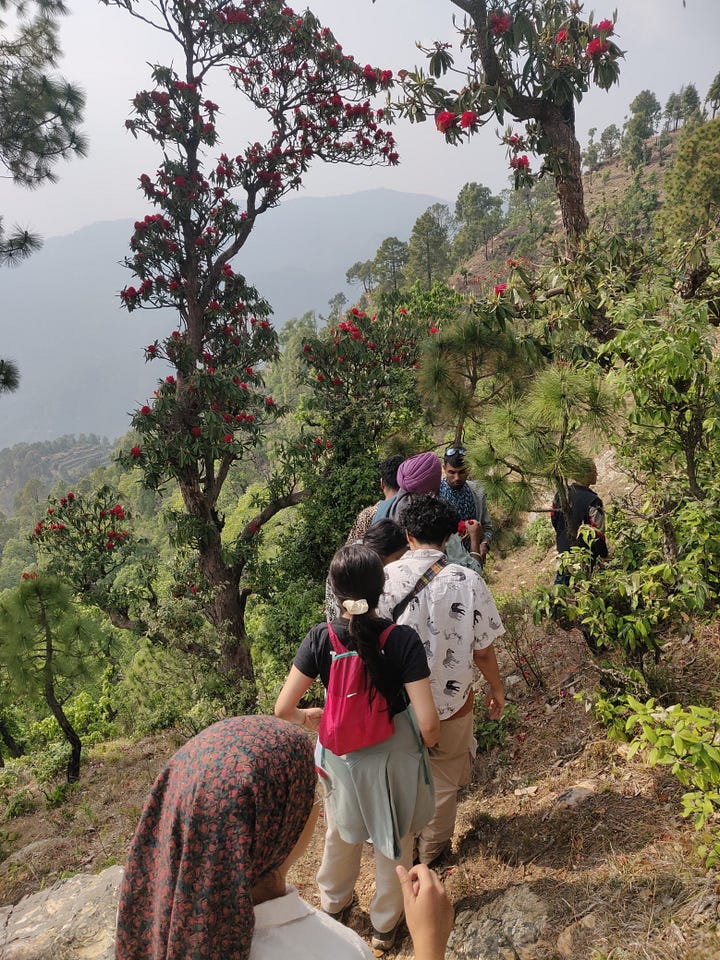
There were extensive discussions on food and agriculture over the week. Some of the topics discussed were:
Vision of Agrarian Policy Making
Historical Context of the Condition of Farmers
Agriculture and Craft Economy
Agrarian Knowledge and Scientific Agriculture
Principles of Organic Farming
Social Economics for a Healthy Agriculture
“Spending seven days with a group of interesting people from across the country, was a very unique experience. Besides thoroughly getting into the academic part of the course, we got ample time to explore the village and the forests during the day and get to know each other...
...Detailed academic sessions coupled with nature walks, early morning farm work along with simple home-cooked food - this is what comprised our seven days.
This course has left me with incredibly thought-provoking conversations and drastically new perspectives about the historical and political contexts leading to the state of economy today. It has also made me more conscious about the food I have every day and the life I lead overall. Besides critically analysing the postcolonial repercussions on agriculture, it has driven me to think more about the evolution of economies at large.”
- Mehar Pandya, M.A. Public Policy, Kings College London
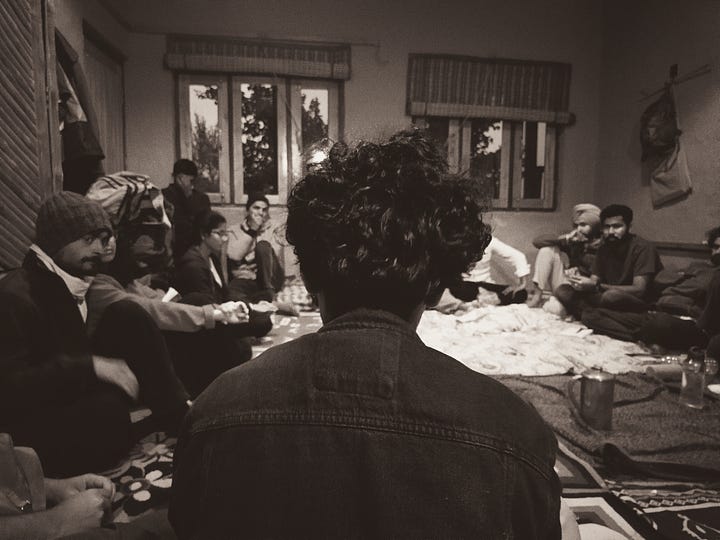
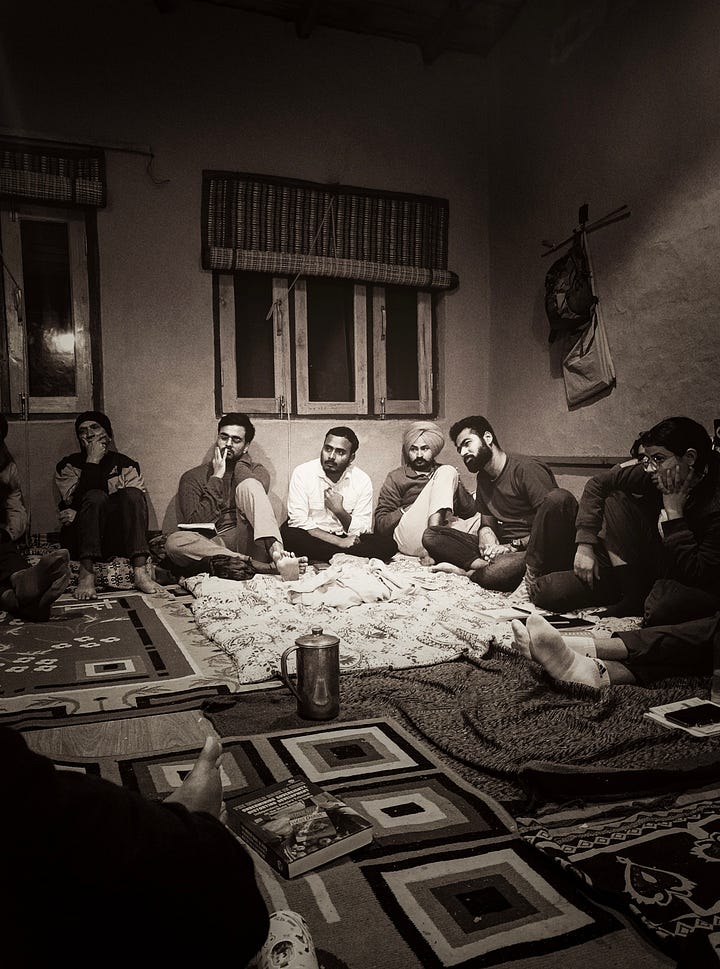
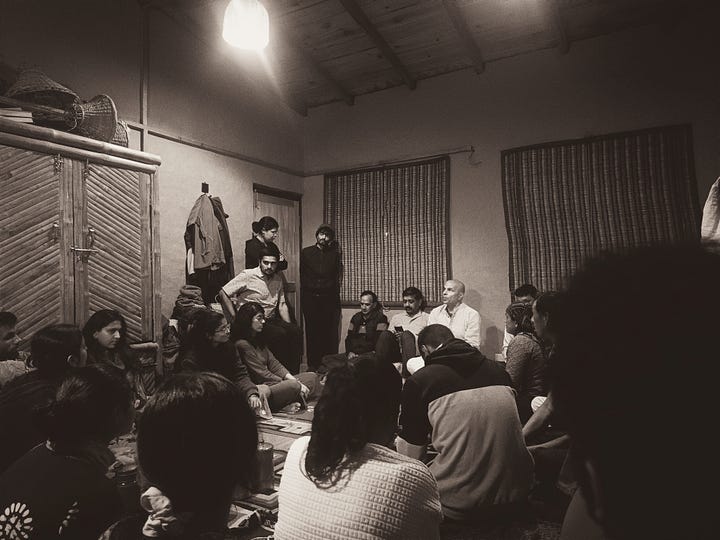

“ਰਾਮਗੜ੍ਹਨੂੰ ਜਾਣ ਦੀ ਯਾਤਰਾ ਦੌਰਾਨ ਕੋਰਸ ਦੀ ਸਮਾਂ-ਸਾਰਣੀ ਪੜ੍ਹਦਿਆਂ ਅਸਲ ਅਹਿਸਾਸ ਹੋਇਆ ਕਿ ਕੋਰਸ ਸਿਰਫ਼ ਖੇਤੀ ਜਾਂ ਭੋਜਨ ਤੱਕ ਸੀਮਤ ਨਹੀਂ, ਸਗੋਂ ਸਾਡੇ ਅਜੋਕੇ ਸਮਾਜ ਦੇ ਸਮਾਜਕ, ਆਰਥਿਕ, ਇਤਿਹਾਸਕ ਅਤੇ ਸੱਭਿਆਚਾਰਕ ਸਰੋਤਾਂ ਦੀ ਡੂੰਘੀ ਸਮਝ ਪ੍ਰਦਾਨ ਕਰਨ ਵਾਲਾ ਹੈ। ਜਿਸ ਵਿਚ ਸਮਾਜਿਕ ਭਾਈਚਾਰਾ, ਰਿਸ਼ਤੇ-ਨਾਤੇ, ਵੱਖ-ਵੱਖ ਕਿੱਤੇ, ਖੇਤੀਬਾੜੀ ਦੀ ਤਕਨੀਕ ਅਤੇ ਨੀਤੀਆਂ, ਹਰੀ ਕ੍ਰਾਂਤੀ, ਭਾਰਤੀ ਭੋਜਨ ਸੱਭਿਆਚਾਰ ਅਤੇ ਇਤਿਹਾਸ ਆਦਿ ਗੱਲਬਾਤ ਕੀਤੀ ਜਾਣੀ ਹੈ।
ਕੋਰਸ ਦਾ ਪਹਿਲਾ ਦਿਨ ਬਹੁਤ ਹੀ ਪ੍ਰਭਾਵਸ਼ਾਲੀ ਰਿਹਾ।...ਦੂਜੇ ਦਿਨ ਪਗਡੰਡੀ ਟੀਮ ਨੇ ਵਿਸਵ ਲੜਾਈਆਂ, ਪੂੰਜੀਵਾਦ ਅਤੇ ਅੰਗਰੇਜਾਂ ਦੇ ਪੋਤੜੇ ਫਰੋਲ ਦਿੱਤੇ।...ਆਉਣ ਵਾਲੇ ਦਿਨਾਂ ਵਿਚ ਜੋ ਕੁਝ ਸਿੱਖਿਆ, ਉਸ ਨੇ ਮੇਰੀ ਸੋਚ ਦੇ ਨਕਸ਼ੇ ਨੂੰ ਥਰਥਰਾ ਦਿੱਤਾ। ਅਸਲ ਵਿੱਚ, ਇਹ ਸਮਝ ਆਈ ਕਿ "ਗਰੀਬੀ" ਅਤੇ "ਅਨਪੜ੍ਹਤਾ" ਵਰਗੇ ਸਬਦ ਸਾਡੇ ਸਮਾਜ ਵਿਚ ਪੂੰਜੀਵਾਦ ਅਤੇ ਅੰਗਰੇਜੀ ਰਾਜ ਦੀ ਵਰਾਸਤ ਹਨ। ਜਦਕਿ ਇੱਕ ਸਮਾਂ ਸੀ, ਜਦੋਂ ਪਿੰਡ ਆਪਣੇ ਆਪ ਵਿਚ ਪੂਰੇ ਸਨ — ਖਾਣ-ਪੀਣ, ਰਿਹਾਇਸ਼, ਸਿੱਖਿਆ ਅਤੇ ਸਿਹਤ ਦੀਆਂ ਜ਼ਰੂਰਤਾਂ ਆਪ ਹੀ ਪੂਰੀਆਂ ਕਰਦੇ ਸਨ।
ਕਿਸੇ ਵੀ ਸਮਾਜ ਨੂੰ ਅਨਪੜ੍ਹਕਿਹਾ ਨਹੀਂ ਜਾ ਸਕਦਾ ਜਿੱਥੇ ਲੋਕ ਆਪਣੇ ਹੱਥਾਂ ਨਾਲ ਲੋਹਾ ਘੜਦੇ, ਖੇਤਾਂ ਵਿਚ ਬਿਨਾਂ ਰਸਾਇਣਾਂ ਫਸਲਾਂ ਉਗਾਉਂਦੇ, ਅਤੇ ਸਿਹਤ ਲਈ ਪ੍ਰਾਕ੍ਰਿਤਕ ਇਲਾਜ ਕਰਦੇ ਰਹੇ। ਇਹ ਸਬਕ ਪਗਡੰਡੀ ਟੀਮ ਵੱਲੋਂ, ਅਸੀਂਮ ਜੀ ਅਤੇ ਨੇਗੀ ਜੀ ਦੀਆਂ ਚਰਚਾਵਾਂ ਰਾਹੀਂ, ਸਾਡੇ ਮਨ ਵਿਚ ਵਾਹ-ਵਾਹ ਕਰਦੇ ਉਤਰੇ।”
(“It was when I went through the course schedule on my way to Ramgarh, that I really realized that the course is not limited to just agriculture or food, but is rather about gaining a deeper understanding of the social, economic, historical and cultural aspects of our present society— in which community, social relationships, various professions, agricultural technology and policies, Green Revolution, Indian food culture and history, etc. will be discussed.
The first day of the course was very impactful...From the second day, the pagdandi team unfurled the story of food and agriculture through world wars, capitalism and British colonialism....What I learned in the coming days shook the core of my thinking. In fact, I understood that words like "poverty" and "illiteracy" are perhaps the legacy of capitalism and British colonialism. There was a time when villages were autonomous and self-sufficient— they fulfilled the needs of food, shelter, education and health on their own.
No society can be called illiterate where people forged iron with their own hands, grew crops in the fields without chemicals, and practiced various natural remedies for health. I take away these important lessons from our discussions with pagdandi team, Aseemji and Negiji.”)
- Simranjit Singh, NITI Aayog Fellow Punjab
“कहीं न कहीं जिन मुद्दों पर बात करने की तीव्र इच्छा थी, उन सभी मुद्दों पर ऐसी सटीक जानकारी, सार्थक संवाद और चर्चाएं इस एक सप्ताह में रहीं, जिनका एक गहरा प्रभाव रहने वाला है। कैसे भोजन केवल भोजन और पोषण का स्रोत न होकर, इस समूचे विश्व की व्यवस्था का केंद्र रहा, कैसे कृषि का दुरुपयोग भारत एवं अन्य कई देशों में गुलामी के लिए किया गया, ये सब विचार करने के लिए मजबूर कर देने वाला था।
अंग्रेज़ी में एक कहावत है, "Until the lion learns how to write, every story will glorify the hunter." कैसे इतिहास का एक पहलू पेश कर जनता को भ्रामिक विचार करने दिए जाते रहे हैं, कैसे शिक्षा के मूल स्वरूप के साथ छेड़छाड़ कर, उससे मानवीय मूल्य, प्रायोगिक एवं व्यावहारिक शिक्षा को कम से न्यून किया जाता रहा है, कैसे भारत के गांवों की सुंदर व्यवस्था एवं सामाजिक सौहार्द को एक रणनीतिक रूप से भंग किया जाता रहा है, कैसे भाषा का प्रयोग किया जाता रहा है, लोगों को भटकाने हेतु, भारत के समूचे पटल से नाट्य, संगीत, वास्तुकला, हस्तशिल्प एवं अध्यात्म को अप्राकृतिक रूप से कम किया गया, विकास की नई गढ़ी गई परिभाषाएं आदि इत्यादि।
एक सार्थक, सोच को नई एवं बेहतर दिशा देने वाला अनुभव रहा।”
- Dr. Akanksha Siddhu, Naturopath and Yoga Consultant, Delhi
“I really appreciate everyone who came together to create a space where we could understand more deeply where we stand when it comes to food, farming, and the different views around it. It made me think about how, knowingly or unknowingly, I am also a part of this system.
I’m calling it a space because it was more than just a workshop. It was the environment we shared, cooking together, thanking those who prepared our food, going on nature walks, meeting locals, and observing their way of life up close. We also had enough time to reflect, which is just as important as listening and observing and documenting. I really liked the overall structure of the program, how each day and the entire week was thoughtfully planned. I especially appreciated that it included shramdaan. It made me feel a little less guilty about using the space, because at least I could contribute in some way. Even if it was small, it felt meaningful to give something back.”
- Anshika Raj, Artist and Filmmaker, National Institute of Design
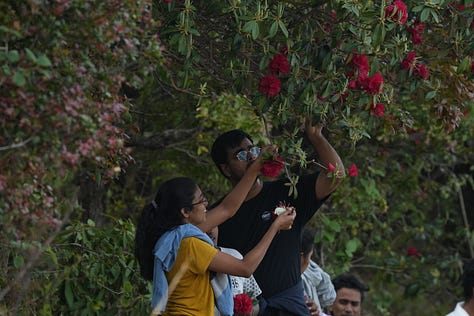
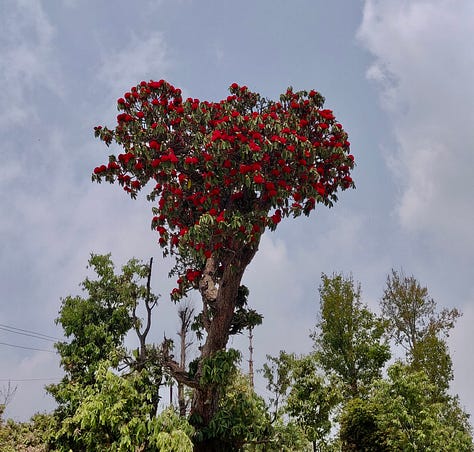

“The course helped me to see through the mirage of mainstream narratives, cut through the noise and listen to meaningful ideas, critically think and decipher the complex systems, political economy etc. It helped me gain confidence and challenge my preconceived beliefs and what is usually fed to us. Lastly it made me reflect, realize and cherish the importance of people, communities, indigenous knowledge systems and what we have in the heartlands of India.”
- Yash Chahande, Freelance Researcher, Maharashtra
The course was offered with the generosity and help of the people of Dutkanedhar, our beloved Kishan bhaiya, Suraj bhaiya, Harish bhaiya, their Aammas and families. This course was also made possible from the support of our well wishers, friends and past participants who keep us going. Pagdandi Collective is able to continue its work with the help of small contributions. We feel a deep sense of gratitude towards our patrons for this support.
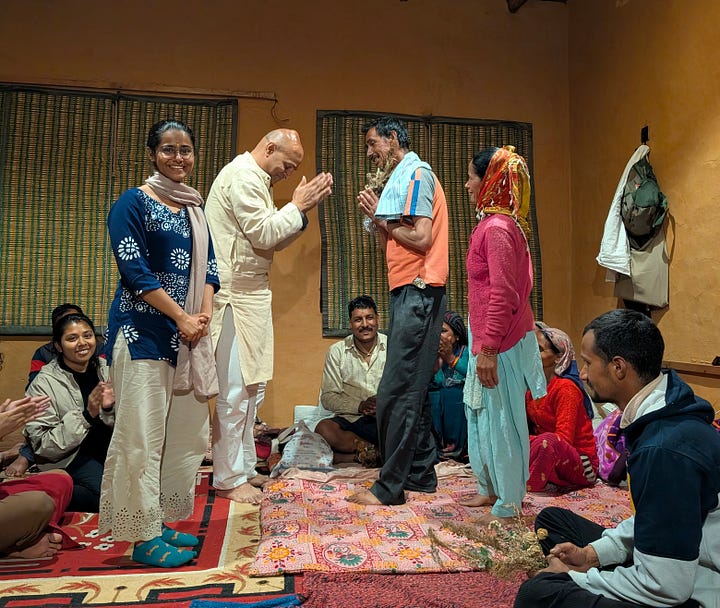
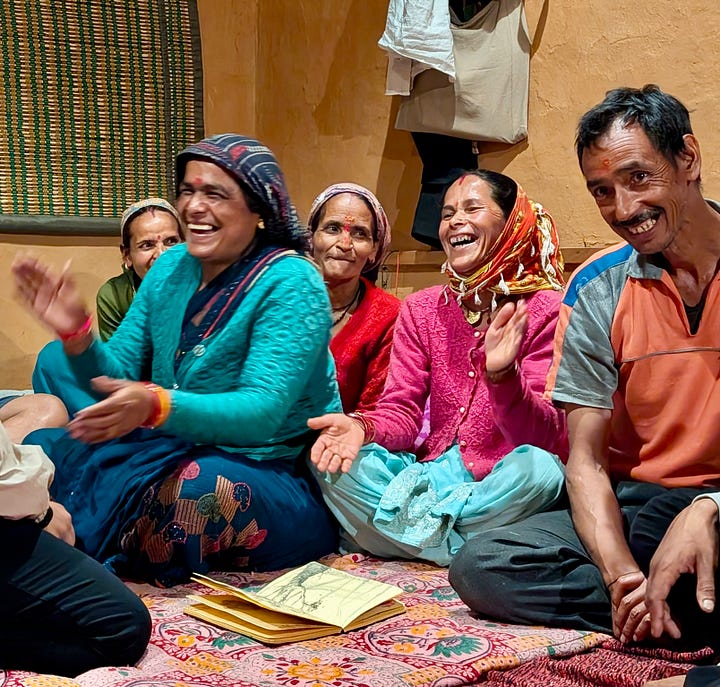
If you would also like to support our work, please reach out to us at pagdandi.collective@gmail.com. To send a contribution, please use the UPI number 8056219285 (please mention ‘for pagdandi’) or get in touch for bank details.



